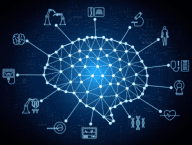It’s no secret that Artificial Intelligence (AI) has become an increasingly integral part of our lives and society. From how we shop to how we communicate, AI has revolutionized how we interact with the world around us. But, with the rise of AI come several questions about what the future could hold for us. For example, what are the implications of AI for our society, economy, and way of life? This article will discuss the various impacts of AI and what the future could look like with its continued development.
Introduction to AI


AI is a broad term that refers to a field of computer science that seeks to create machines and computer algorithms that can think, learn, and solve problems like humans. AI is a rapidly evolving field, and its applications are vast and varied. For example, you can use AI for medical diagnosis, image recognition, and more mundane tasks like facial recognition and natural language processing. In addition, you can use AI more unpredictably, such as in robotic process automation, autonomous vehicles, and intelligent personal assistants.
The potential of AI is immense, but it also carries with it some ethical and practical considerations. Therefore, to fully understand the implications of AI, it is essential to consider its potential benefits, challenges, and impact on the future.
The Rise of Artificial Intelligence?


Imagining inanimate objects with intelligence has been a concept that has been around for many years. The Greeks used to tell stories of robots, while the Egyptians and Chinese constructed automatons. It took a more serious turn when philosophers of antiquity tried to explain human thinking through symbols. At the Dartmouth College conference in 1956, they used the term ‘artificial intelligence’ for the first time.
In recent years, AI has gained traction in tech, and its applications have expanded rapidly. It is mainly due to advances in machine learning and data processing and the abundance of data available for analysis. As a result, AI is used in various industries, from health care to finance, and its potential applications are seemingly endless.
Many factors, including the increasing availability of data, the advancement of machine learning, and the growing demand for automation, have driven the rise of AI. As AI continues to evolve, its potential applications will continue to expand.
Benefits of AI


AI has the potential to provide several benefits to society. For example, you can use AI to automate mundane tasks and free up time for people to focus on more critical studies. You can use AI to process and analyze large amounts of data quickly and accurately, which you can use to identify patterns and make predictions. In addition, AI can improve decision-making by providing more accurate and timely information.
You can use AI to improve customer experiences by providing personalized recommendations and tailored experiences. You can also use AI to enhance safety and security by monitoring and analyzing real-time data to identify potential threats.
Challenges of AI
Despite the potential benefits of AI, there are also many challenges associated with its use. One of the most significant challenges is the potential for AI to amplify existing biases and inequalities. If you do not design and implement AI properly, it can perpetuate existing biases and lead to discrimination and unfair outcomes.
Another challenge associated with AI is the potential for job loss. As AI evolves and becomes more sophisticated, it could potentially replace human workers in specific roles, leading to job losses and economic disruption.
The rise of AI also raises several ethical considerations. First, AI is a powerful tool that could have severe consequences if you do not use it responsibly.
Potential Impact of AI on the Future
The potential impact of AI on the future is difficult to predict, but it is likely to be significant. Many businesses are already using AI, and its applications can expand in the future. As AI continues to evolve, it could potentially lead to new industries and the transformation of existing ones.
The rise of AI could also lead to creating new jobs and displacing existing ones. AI could also have implications for how we live, as it could potentially lead to the automation of mundane tasks and the creation of new ways of interacting with the world.
Social Implications of AI
The potential social implications of AI are far-reaching. For example, AI could potentially lead to increased inequality, as some people may be unable to access the benefits of AI technologies or may be left behind due to the displacement of traditional jobs. AI could also lead to increased surveillance as we continue to use AI technologies to monitor and analyze people’s behavior.
In addition, AI could lead to new communication and social interaction forms. AI could potentially lead to the emergence of new languages and forms of communication and new ways of expressing emotion.
Ethical Considerations of AI
Examining the moral implications of AI is complicated and has effects that extend to many areas. AI technologies are a powerful force; if we do not manage them properly, they could have severe implications for people worldwide. Therefore, it is critical to contemplate the ethical considerations of AI and ensure that AI technologies are created and used honestly and responsibly.
AI and Privacy
The rise of AI has raised many questions about privacy. We can use AI technologies to track and monitor people’s behavior, and if not used responsibly, it could potentially lead to a breach of confidentiality. Therefore, it is crucial to consider AI’s implications on privacy and ensure that we use AI technologies responsibly and ethically.
AI and Security
We can use AI technologies to improve security. For example, we can use AI to detect and analyze potential threats in real time, and we can use AI to enhance the security of systems and networks. However, AI technologies also have the potential to be malicious and could potentially be used to exploit weaknesses in systems and networks.
AI and Autonomy
AI technologies also have the potential to increase autonomy. We can use AI technologies to automate mundane tasks, freeing time for people to focus on more critical issues. We can also use AI to make decisions on people’s behalf, identify patterns, and make predictions.
Conclusion
In conclusion, AI has the potential to revolutionize the way we interact with the world around us. AI has several potential applications, from automating mundane tasks to providing personalized recommendations. But first, we must consider AI’s potential implications and ensure we use AI technologies responsibly and ethically.
AI is a powerful tool, and its potential impact on the future is difficult to predict. As AI advances, it is essential to contemplate the possible repercussions of AI and to ensure that we implement AI technologies responsibly and morally.
The future of AI is uncertain, but its implications are far-reaching and could potentially have a significant impact on our society.
Check out Markitome to stay up to date with the latest in Digital Marketing.



We hope you’re enjoying reading our blogs… Don’t forget to secure your browsing experience with Nord VPN. Click the banner below to learn more
More To Explore
Redefining Digital Marketing in 2024: 10 Game-Changing Trends
In the ever-evolving world of digital marketing, staying ahead of the curve is essential. As we approach 2024, it’s crucial to be aware of the
SEO Mania-7 Proven Strategies for Explosive SEO Growth in 2024
Understanding the Importance of SEO in 2024 In the ever-evolving world of SEO, staying ahead of the curve is crucial to your online success. As